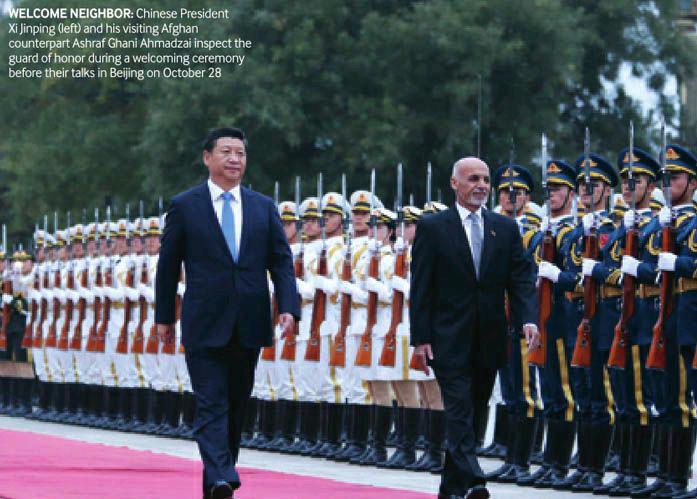Rebuilding Together
2014-12-01ByYuLintao
By+Yu+Lintao

One month after assuming office, Afghan President Ashraf Ghani Ahmadzai chose China as the destination of his first official foreign visit. Though it came as a surprise to some in the Western media, Chinese observers and some Afghan political analysts claimed that Ahmadzais latest move to deepen bilateral relations with China is understandable.
The U.S.-led NATO combat mission in Afghanistan, which began in 2001 with the ousting of the Taliban regime that sheltered Al Qaeda leaders, is scheduled to come to an end this December. While a bilateral security agreement signed between Afghanistan and the United States on September 30 allows a limited number of troops to remain in Afghanistan after NATO-led troops pullout, the war-torn Central Asian country is quietly preparing for a postNATO situation.
Despite the decade-long military involvement of the NATO coalition, Afghanistan has not seen adequate improvement, as terrorist activities by extremist groups like Taliban are still rampant. Following the withdrawal of NATO forces, the future security situation in Afghanistan has been plunged into greater uncertainty.
Worse yet, Afghanistans economy is still far from self-sufficiency. Even the government finance of the country is highly reliant on foreign assistance. A World Bank report estimated that more than 60 percent of government spending of Afghanistan comes from international aid.
Media reports showed that due to a sharp decline of fiscal revenue, the Afghan Government suspended the payment of its employees in October. The country is facing a new round of economic recession and unemployment is more prominent, further affecting social stability while increasing the possibility of the unemployed youth turning to the Taliban.
“Under the current situation, it is vital for the Afghan Government to seek support from other countries for its own stability and development. As Afghanistans largest neighbor and the worlds second largest economy, China inevitably becomes the first choice,” said Fu Xiaoqiang, a senior researcher on Afghan studies with the China Institutes of Contemporary International Relations (CICIR).
Some Afghan observers agree with Fu, noting that as an economic powerhouse and a good neighbor of Afghanistan, China can play a vital role in stabilizing the conflictridden country through investment in economic projects there.
In an interview with Xinhua News Agency, Ebraheem Darwishian, a professor at Kabul University, opined that the main reason for continued instability in Afghanistan is the high rate of unemployment and poverty, adding that China can create job opportunities and contribute to stability by investing in the country.
“Since the conflicts and insecurity halt investment in Afghanistan, which is the victim of terrorism, and China is experiencing terror challenges as well, it would benefit both countries to address terrorism jointly,” Darwishian said. He added that Afghanistan needs Chinas longterm support in the wake of NATO-led forces2014 withdrawal from Afghanistan.
Security concerns
Observers claimed that China is indeed preparing to play a larger role in Afghanistans reconstruction.
Professor Zhang Li, an expert on South Asian affairs with Chengdu-based Sichuan University in southwest China, said that the Chinese Government cannot allow more terrorist attacks in Xinjiang Uygur Autonomous Region, which borders Afghanistan. Thus, Chinas cooperation and assistance to support Afghanistans domestic stability becomes particularly important for the two countries to address shared security concerns.
“China will continue to play a greater role as a coordinator of the post-war reconstruction of Afghanistan,” Zhang said. But he stressed that China will never send troops to Afghanistan.
China hosted the fourth ministerial conference of the Heart of Asia/Istanbul Process in Beijing during President Ahmadzais visit. Aimed at boosting regional cooperation for strengthening security in Afghanistan and its near and extended neighbors, the Heart of Asia Process was launched in Turkey in November 2011.
To promote result-oriented cooperation through practical means, the Heart of Asia/Istanbul Process has identified a number of confidence-building measures in areas including anti-terrorism, drug control, disaster management, trade and investment opportunity, regional infrastructure construction and education to be jointly implemented by interested participating and supporting countries and organizations.
The Beijing conference ended with a declaration calling for the national political reconciliation of Afghanistan. It also promised assistance to the country on the basis of mutual respect. A total of 64 priority programs were identified in the conference this year, which will help Afghanistan develop its national governance, self-development, public security and defense.
As Afghanistan is currently at a crucial stage for its economic, political and security transition, observers said the meeting will exert significant influence on future developments.
The Heart of Asia/Istanbul Process has been trying to resolve the blame game between Afghanistan and Pakistan on the issue of the Taliban and other insurgent groups operating in the mountains that separate the two countries. Kabul has often claimed that the Taliban have used their sanctuaries in Pakistan to launch attacks in Afghanistan, indicating that Islamabad has prior knowledge of the attacks, a charge that has been repeatedly denied by Pakistani authorities.
Since China is friendly to both Kabul and Islamabad, analysts said that Beijing can be relied upon to use its influence and vast resources to resolve the long-standing feud.
Fu of the CICIR said that the stability of Afghanistan is highly relevant for Chinas peripheral security strategy. As terrorist forces in Xinjiang are closely tied to Afghanistans extremist groups, helping maintain Afghanistans security meets Chinas interests.
Wang Shida, another researcher with the CICIR, claimed that the recent Beijing conference of the Heart of Asia/Istanbul Process will not only help the new Afghan Government to complete the triple transition, but also enhance trust and clarify doubts among regional countries, creating a sound political climate favorable to the final settlement of the Afghan issue.
Assistance and cooperation
During Ahmadzais Beijing trip, China pledged to provide 500 million yuan ($81.8 million) in grant assistance to the Afghan Government for 2014 and a further 1.5 billion yuan ($244 million) over the upcoming three years.
According to a joint statement signed by the two governments in Beijing, the Chinese side will also implement assistance and training plans for Afghanistan, and will work to open training courses on anti-terrorism, drug control and disaster management. China will help Afghanistan train 3,000 people of all circles in the upcoming five years and provide 500 scholarships.
During a talk with Ahmadzai, Chinese President Xi Jinping also promised that China will enhance its support for Afghanistans peaceful reconstruction, help Afghanistan frame a plan on national economic and social development, and train professionals, as well as developing agriculture, hydroelectricity and infrastructure construction.
Moreover, China also pledged to bolster tangible progress on major projects like the Aynak copper mine and the Amu Darya basin oil project. Ahmadzai welcomed Chinese investment in areas like oil, mining and infrastructure, adding that Afghanistan will work to ensure the safety of Chinese institutions and personnel.
Wang noted that due to security concerns arising from the election deadlock between Ahmadzai and his presidential rival, Abdullah Abdullah, earlier this year, as well as the NATOled troops scheduled withdrawal, most international investors have taken a wait-andsee attitude, and actual investment from the outside world has actually come to a full stop. Thus, Chinese investment is actually playing a huge role in restoring confidence for the economic reconstruction of the country.
“The new Afghan Government also hopes the cooperation with China in the two projects, the Aynak copper mine and the Amu Darya basin oil project, will become a good example for the countrys mineral resource exploitation, increasing government fiscal revenue and job opportunities,” Wang commented.
Currently, Chinese enterprises have invested in several projects in Afghanistans infrastructure construction and resource exploitation areas. Observers said that Chinas strategy to help Afghanistans stability will probably encourage more Chinese investment in the country.
In addition, as Afghanistan is also a part of Chinas Silk Road Economic Belt development strategy—which promotes the interconnection between China and Central Asian countries—Afghanistan may also receive heavy investment in infrastructure construction from China as well as other sources. Wang said that the Silk Road Economic Belt strategy will help Afghanistan to boost its economy, while the countrys economic development, in turn, will help contain the rise of Afghanistans extremist forces.
